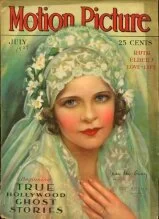The Case of the Two Phantom Fliers
A true ghost story from early Hollywood screen actress Betty Compson, originally written by Dorothy Donnell for "Motion Picture" magazine, issue July, 1929.
The Night in the Lonely Camp
“I only know what happened.” That is what Betty Compson said, chin in hand, as she told me this tale about the ghost who made love to her and the other who came back that night in the lumber camp at Truckee in the great woods to tell her of the aeroplane that he was building in what we choose to call the Great Beyond.
It began, Betty said somberly, seven years ago. And the last time she talked with Philip Rust, who had lived his earth life in West Virginia, was five months ago. But time means nothing to the dead, though so very much, alas, to the living. “Which is the advantage of having a ghost for a suitor,” smiles Betty. “He doesn't know that one is getting older. But except for those two times, I haven't talked to Philip. I think perhaps it isn't best for human beings to get too friendly with spirits.”
It was November day in 1922 when Emory Rogers, a young aviator who had made a name for himself in Los Angeles by his daring stunt flying, stood buckling on his leather helmet in the Rogers Airdome, named in his honor. Outside on the field, an expectant Sunday crowd stood waiting for him to make an exhibition flight.
The peremptory honking of an auto horn brought him to the door to find two friends with whom he had worked in the movies, beckoning from a sports roadster. “Bob and I are going to the races at Ascott,” said Betty Compson. “We want you to come along with us.”
“Sorry, Betty.” Emory Rogers shook his head. “I've got to fly this afternoon. Wish I didn't have to. I don't feel so good – headache, I guess. But I can't disappoint all these people waiting to get their tonsils sunburned.”
The girl at the wheel shifted her gears. “Well, drop in at the house afterward and have a cocktail, anyhow,” she called back over one silk-sweatered shoulder; and she thought as she sped away that she heard him call cheerily, “Righto! I'll be there.”
The Doorbell Rings
It was four o'clock before Betty and her escort returned to the pretty California bungalow she had bought with her first movie success, and for some unknown reason the first words she spoke to her mother were, “Has Emory Rogers been here?”
“I haven't seen anything of him,” Mrs. Compson answered. “The only sign of life there's been on this street all the afternoon was a boy selling an extra five minutes ago. I couldn't make out what he was shouting.” All very ordinary and homey, you see. Anyone of the three of them in the sunny living-room would have laughed if anyone had asked them whether they believed in ghosts. And yet – perhaps at that moment they were very close to the unknown. But there seemed nothing extraordinary in the ringing of the front doorbell.
“There's Emory now,” Betty said. “Crack the ice, Bob.” The front door opened, and after a moment boomed shut again. Betty reappeared, looking puzzled. “Didn't you hear the bell?” she asked. “That's funny. There's no one there.”
They gazed at one another, but before they could speak the doorbell rang again, more insistently as if whoever pushed the button was impatient at being kept waiting. Before the sound had died away, Bob was at the door – only to find the doorstep empty, and no one in sight.
The sun lay across the rugs, a clock ticked prosaically, and a basket of mending stood on the table by the window. It was the same room – and yet different. Familiar objects did not look quite the same – it was as though fear had come among them. And when the doorbell rang a third time and a third time there was no one there to ring it, Betty sank down on a chair pale and trembling. “Something has happened,” she whispered. “Something terrible.”
“Nonsense; it was some of the boys on the street up to their tricks.” Her mother soothed her. They're hiding behind the bushes laughing at you, probably.” (Photo above left: Betty Compson - Hollywood star whose true ghost story appeared in the magazine.)
News of the Death
“Uxtry! Uxtry! All about the turrble accident.” The newsboy was making a return trip, and Bob went out to meet him. He came back with a white face, handing Betty the paper with the flaring headlines. “Aviator Crashes to His Death as Crowd Looks On,” she read. “Emory Rogers Killed by Mystery Accident. It is believed that some part of the plane must have given way without warning.”
Emory Rogers has made the plane himself. He was passionately proud of it, proud enough perhaps to come back from the far place where he had gone to defend it. (Photo at right: One of the last known photographs of aviator, Emory Rogers, who spoke from the Great Beyond.)
A location trip to the Truckee is always tiresome, and the company making “Over the Border” - significant title! - found the evenings endless. The men of the company could yawn over poker in the back room of the hotel where they were billeted, but the only two women along – Betty Compson and the script girl – were bored to the point of desperation at the end of the first week. It was the script girl who suggested making a ouija board out of a playing card and a letter sheet of paper and asking it questions, just for fun.
The card, an ace of hearts with one end pointed, slipped aimlessly over the paper under manicured finger tips, refusing to answer their giggled queries as to future husbands and success in pictures until, just as they were about to give it up, suddenly it began to move slowly and purposefully among the letters, spelling out amazing words.
“I am Lietenant Philip Rust of Wheeling, West Virginia. I was killed in the World War.”
The Ghoulish Gallant
The two girls stared at each other. In the room beyond roars of laughter from the poker players sounded suddenly faint and far away. The polished pasteboard moved again under trembling finger tips. (Image at left: 1929 ghost story photo showing the Hollywood starlet communicating with the spirit of Emory Rogers through use of an ouijia board.)
“I saw you in a picture. They ran it for us in France,” it said. “I fell in love with you then. If I had not died, I would have come out here and found you.”
The pointer went on, picking out the letters, forming ardent words. She was the most beautiful woman he had ever seen. He had gone to his death thinking about her picture. And then, as if conscious that even a ghostly suitor should have references, he spoke of his family, his education at the University of West Virginia, begged her to write his mother.
“I made inquiries,” Betty says. “I found there was a wealthy family name Rust in West Virginia, and then – I didn't go on any further. I was afraid.”
“H-how did you get killed?” chattered the script girl presently. Her voice sounded weak and silly against the masculine tumult in the room beyond, but the pointer answered her simply. “I was shot down in an aeroplane by a German Fokker.”
Betty spoke then: “I had a friend who was killed kind of like that, just six months ago. Do you know – have you met -” “How should one talk to ghosts? His name was Emory Rogers.”
“I don't know him,” Lieutenant Rust said. “It's a bit difficult to find people here. But I'll try if you'll be here tomorrow night.”
As soon as they touched the pointer the next evening, it began to talk in evident excitement. “I've got Emory Rogers here. He's a great chap. I'm certainly glad you told me about him. Both being aviators, and both dying the same way, has made us friends already. He wants to speak to you.”
“H -h-hello, Emory,” faltered Betty Compson.
The pointer was moving very differently now, darting more swiftly about the board with a jerky motion. “Hullo, Betty,” it spelled. “Where's Bob? Gosh! How I do love you two fool kids.”
The tears sprang to Betty's eyes. His way of phrasing things – she could not be mistaken! “Emory,” she whispered. “What happened to you on that flight?”
He Rang It
“I fainted,” he answered. “But nothing went wrong with the plane, Betty. She was going as sweet as a song. I wish you'd tell them that. It was my old sinus trouble. I didn't feel like going up that afternoon. Remember? I told you so.”
“I remember,” she nodded. “There's another thing I remember too. I asked you to drop in at my house on your way home and have a cocktail. And the door bell rang – three times.”
“I rang it.” The pointer was moving like a live thing now, picking out the letters almost too swiftly for them to see. “I thought I'd stop in and ask you about the races.”
“But,” Betty spoke with lips suddenly dry, “that was after the accident.”
“Yep,”said the pointer with dreadful matter of factness. “You see I didn't know that I was dead then.”
No ghosts? But you and I know better, you and I and Betty Compson who sat in that dark and windy mountain cabin and talked with a friend who had died. In the old slangy, clipped phrases he told her that people went on with their work wherever they were. He was making a marvelous new model of an aeroplane now. Betty really ought to take up flying. It was all quite commonplace talk, if there had been a young aviator sitting there beside them. But there was no one. (Story photo above, right: The red rectangle marks the hotel room where the ghost was contacted through use of an ouija board in the 1920s.
 How He Knew
How He Knew
One thing more she asked him. “How did you find out that you are – dead, Emory?”
“I met my Aunt Elinor.” the pointer spelled. “She died when I was a kid. When I saw her coming toward me I knew that I must be dead, too.”
“I called up Emory's mother when we got back to Hollywood,” Betty Compson says quietly. “I asked her if she had ever had a sister and she told me, 'Yes, one. Her name was Elinor and she died twenty years ago.'”
Was she afraid of whatever stood beside her that night at the Truckee? Betty Compson shakes her head, “They were so young – such nice boys. Emory just want to tell me that his plane hadn't failed him. And Philip Rust -.” She smiled a little secret smile. After all, why shouldn't a ghost, a gallant young Southern ghost, come back for the purpose of making love to a pretty lady? Somehow I feel certain that Betty Compson will take her ouija board and listen to Lieutenant Rust again some day.
(Above: Motion Picture magazine from 1929.)
Learn more about: Hollywood's Famous Ghosts

